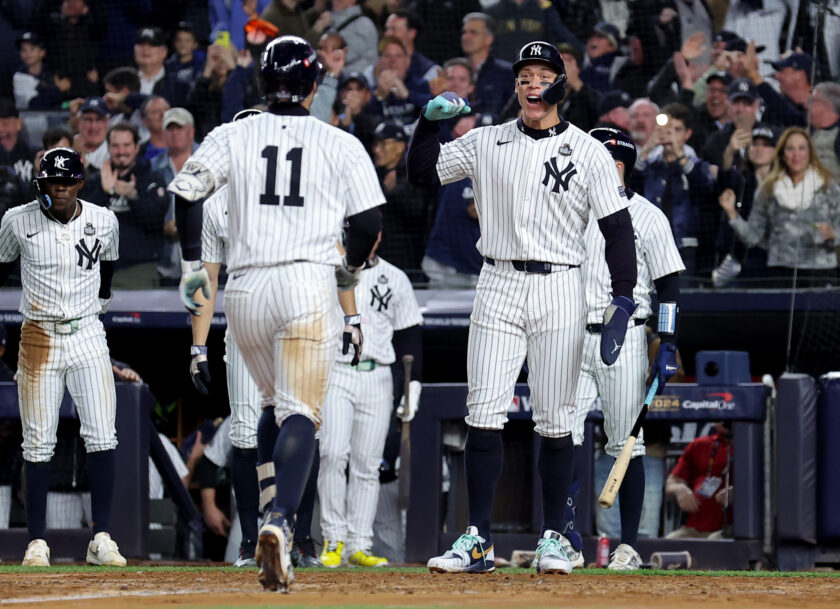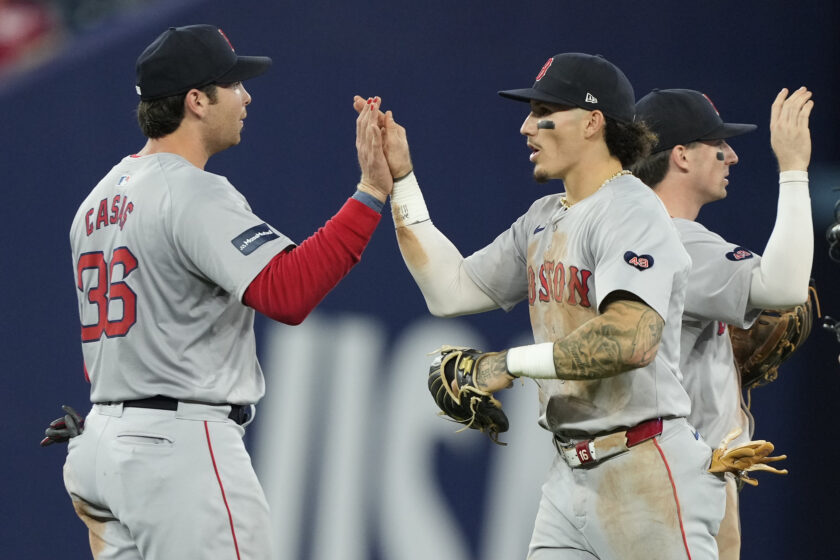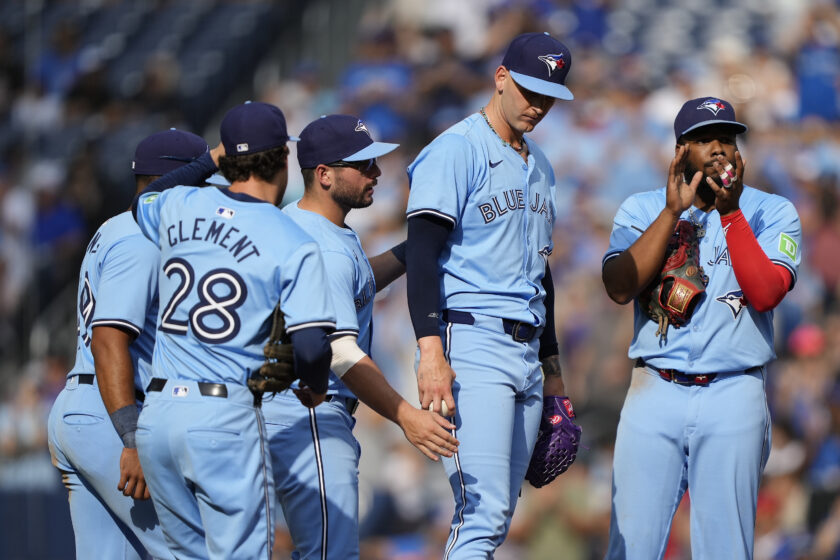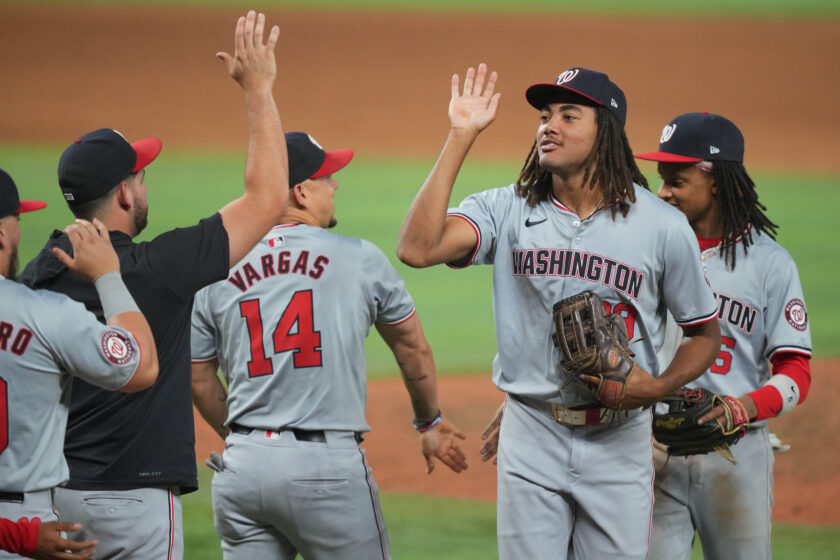New York Jets: 5 AFC Storylines including Sam Darnold’s sophomore leap
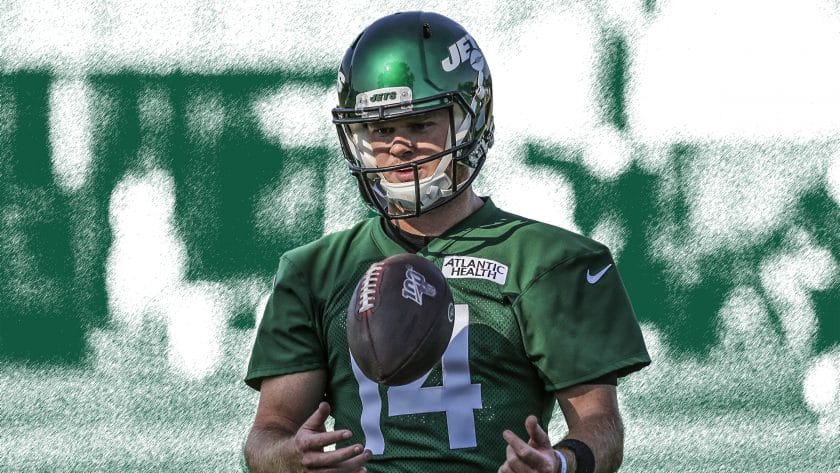
Here are five storylines to follow in the AFC, including if Sam Darnold can improve and become a franchise quarterback for the New York Jets.
[sc name=”Ryan Honey Banner”]Earlier this week, I made a list of five NFC storylines to follow in the NFL this year. It included the Eli Manning–Daniel Jones situation for the New York Giants as well as if quarterback Jimmy Garoppolo can return as effective for the San Francisco 49ers.
Now, I’ll give the five storylines for the AFC. I had to debate with myself for which ones had to be left off the list. Ultimately, I wanted to include at least one team from each division (I did the same for the NFC).
So, that being said, here are five storylines to follow in the football conference most certainly led by quarterbacks Tom Brady and Patrick Mahomes.
Disclaimer: these aren’t in any sort of rank-type order. They simply go in order of division (East to West).
1. New York Jets: Will Sam Darnold improve in year No. 2 and become the franchise quarterback the team hopes he’ll be?
The New York Jets selected quarterback Sam Darnold with the No. 3 pick in the 2018 draft out of the University of Southern California. Having been a great quarterback in college, many fans the year before used the phrase “suck for Sam,” meaning they wanted their team to tank in order to draft Darnold.
People still have such high hopes for him to the point where they still believe the Giants should’ve passed on Saquon Barkley and taken Darnold at No. 2 in that draft. Yes, there are people out there with the thought in their minds that Big Blue should’ve passed up on the dude who ended up winning AP Offensive Rookie of the Year, the Pepsi Rookie of the Year, the FedEx Ground Player of the Year, and made the Pro Bowl.
However, despite the hype coming out of college, Darnold had a merely-average rookie season. In 13 games (all starts), Darnold completed 57.7% of his throws for 2,865 yards, 17 touchdowns, and 15 interceptions. He put up a quarterback rating of 77.6 on the season. Darnold also did some work with his feet, averaging 3.1 yards-per-carry with 138 yards and one touchdown.
Yes, he didn’t have the best numbers, as he had a record of 4-9 in his 14 starts. The Jets eventually finished 4-12 on the year, which helped them get the No. 3 pick in the draft for the second consecutive year. However, that’s not entirely Darnold’s fault, at least in my opinion. I’ve never been a fan of throwing a rookie quarterback in there to start right away. It takes a lot more than just training camp and preseason to really learn how to play quarterback in this league.
However, things are looking up for Darnold coming into year No. 2. Why?
Well, first, we’ve seen a trend as of late with quarterbacks coming into their own during their sophomore campaigns in the NFL.
Chicago Bears quarterback Mitch Trubisky had seven touchdowns and seven interceptions his rookie year in 2017, completing 59.4% of his throws for 2,193 yards through 12 games. Then, in year No. 2, he had 24 touchdowns and only 12 interceptions, his completion percentage increased to 66.6% and he threw for 3,223 yards through 14 games. He ultimately helped the Bears get back to the playoffs, as they won the NFC North division. Not to mention, he made his first Pro Bowl in 2018 as well.
Philadelphia Eagles quarterback Carson Wentz had 16 touchdowns and 14 interceptions in his rookie year. Year No. 2 saw a massive improvement, as he threw for 33 touchdowns with seven interceptions before ACL and LCL tears ended his season. His quarterback rating increased from 49.4 in year one to 77.2 in year two. Wentz was on his way to an NFL MVP before the injuries too.
What about Los Angeles Rams quarterback Jared Goff? He threw five touchdowns and seven picks in seven games in his rookie year, then threw 28 touchdowns and seven picks in year two, helping the Rams get to the playoffs. Goff also made his first Pro Bowl in year two.
What did Trubisky and Goff get in year two to help them improve? Offensive-minded coaches in Matt Nagy and Sean McVay, respectively. Well, looks like Darnold is in luck in those regards. The Jets hired the offensive-minded Adam Gase to be their head coach this offseason.
Gase has had success before from that side of the ball as well. He was the offensive coordinator for the Denver Broncos in 2013 and 2014 when they were first in total yards (457.3 yards per game) and fourth in total yards (402.9 yards per game), respectively. They were also first in scoring (37.9 points per game) in 2013 and second in scoring (30.1 points per game) in 2014.
Darnold also has a new All-Pro running back in Le’Veon Bell and a wide receiving corp that has potential with Robby Anderson, Quincy Enunwa and Jamison Crowder.
With the weapons and coaching around him, my prediction is that Darnold will have a big year in 2019 and help the Jets get to the playoffs. Being that they’re in the same division as the New England Patriots, they’ll most likely have to settle for a Wild Card spot in the AFC Playoffs.
Congrats Jets fans, you finally got your quarterback for the future.
2. Baltimore Ravens: Can Lamar Jackson really lead an NFL franchise?
Last year, the Baltimore Ravens finally made the decision to part ways with longtime quarterback Joe Flacco.
The Super Bowl-winning quarterback started the first nine games of the season, reprising his usual role. However, he suffered an Inguinal Hip Strain in November and wasn’t set to return until December. At the point of his return, however, the Ravens already decided to stick with quarterback Lamar Jackson. The Ravens took Jackson in the first round (No. 32 overall) of the 2018 NFL Draft.
Jackson, all-in-all, had the offense and the team on the right track. Flacco led the team to a 4-5 start before the injury. Jackson ended the regular season 6-1 as a starter. His only loss was to the eventual top-seeded-Kansas City Chiefs, in which they fell 27-24 on the road. Jackson ultimately led the Ravens to a 10-6 record and an AFC North title.
Along with his seven starts, Jackson appeared in every game for the Ravens as a rookie. He finished the year with a 58.2% completion percentage with 1,201 yards through the air, six touchdowns, and three interceptions. His quarterback rating was 84.5.
On the ground, Jackson racked up 695 yards and five touchdowns on 4.7 yards-per-carry. He did have 12 fumbles on the year, four of which he lost.
Despite Jackson’s hot streak, he only completed 48.3% of his throws in the Wild Card game against the Los Angeles Chargers. He did have 194 yards for two touchdowns and one interception as well, with 54 rushing yards on nine carries and three fumbles (one lost).
He definitely can put up stats for the Ravens from the quarterback position and be a dynamic, versatile threat in the offense. However, can Jackson prove that his success as a starter thus far isn’t just a one-year thing?
My problem with very mobile quarterbacks is that they rely too much on their feet to get the job done. Quarterbacks shouldn’t do that. They have a higher chance of getting injured and definitely aren’t the ball-carriers that running backs and receivers are. Twelve fumbles? Four fumbles lost? Not a great statistic for Jackson.
The Ravens did add running back Mark Ingram, who can also be a threat in the passing game. Ingram had 645 rushing yards and six touchdowns last year for the New Orleans Saints on 4.7 yards-per-carry through 12 games. He also caught 21 balls for 170 yards and one score through the air.
Jackson also has receiver Willie Snead IV, who caught 62 receptions for 651 yards and one touchdown through 16 games last year for Baltimore. He’s not dominant in the passing game, but he’s definitely a reliable option.
My prediction is this: Jackson will need the help he gets from the players around him. If he does, which will take the pressure off of him, he’ll succeed for the Ravens. However, if he doesn’t, we could see a decrease in confidence from the Ravens fans regarding his level of play in 2019.
[sc name=”Jets Center”]3. Cleveland Browns: 2017: 0 wins, 2018: 7 wins, 2019: ???
The Cleveland Browns were winless in 2017, actually declining from their previous season, where they saw one victory. They were the biggest laughing stock of the NFL, and it wasn’t even close.
However, things are looking up for the Browns now. Prior to the 2018 season, they chose Heisman Trophy-winning quarterback Baker Mayfield with the No. 1 overall pick in the draft.
Last season, Mayfield made a great case for himself to win the AP Offensive Rookie of the Year award, despite not winning it. Through 14 games (13 starts), Mayfield completed 63.8% of his passes for 3,725 yards and 27 touchdowns. The 27 scores through the air broke an NFL record for rookie quarterbacks. Mayfield posted a 6-7 record as a starter, which on the surface isn’t great, but it helped the Browns total seven more wins than they had in 2017.
The addition of wide receiver Jarvis Landry last year also helped the Browns improve, and helped Mayfield get acclimated to the NFL quarterback-type life early on.
This offseason, the Browns added Pro Bowl wide receiver Odell Beckham Jr. They gave the Giants a first-round pick (No. 17 overall), a third-round pick (No. 95 overall), and safety Jabrill Peppers for the star receiver.
Despite an eight-game suspension due to domestic violence, the Browns also added Pro Bowl running back Kareem Hunt. With those new additions, along with a new head coach in Freddie Kitchens, the Browns could definitely become contenders in the AFC North division.
I’m not going to go as far to say that they’re Super Bowl contenders this year, because they’re not. However, I do believe the Browns have the talent to compete in their division for a playoff spot.
My prediction is that they’ll go 9-7 and squeak into the AFC Playoffs as a Wild Card team.
[sc name=”Jets Link Related” link=”https://elitesportsny.com/2019/07/20/case-for-new-york-jets-dethroning-new-england-patriots-in-afc-east/” text=”The Case For The Jets Dethroning The Patriots In The AFC East” ]4. Jacksonville Jaguars: Will Nick Foles be the missing piece that this team needs?
In 2017, the Jacksonville Jaguars proved to be a contender in the AFC when no one thought they would. They went 10-6, won the AFC South, and were runner-ups in the AFC Conference Championship.
Going into 2018, some people predicted them to represent the AFC in the Super Bowl that year. However, that wasn’t the case. At all.
The Jags went 5-11, finishing in last place in the division.
It was never their defense that was the problem. In 2017, their defense ranked No. 2 in the NFL in total yards allowed per game (286.1) and led the league in passing yards allowed per game (169.9).
In 2018, they were right around the same caliber on that side of the football. They ranked fifth in the league in total yards allowed per game (311.4) and second in passing yards allowed per game (194.6).
What was the problem, however, was their offense. More specifically, their quarterback Blake Bortles.
In 2017, Bortles had 3,687 yards, 21 touchdowns, and 13 interceptions with an 84.7 quarterback rating. He was 10-6 in his 16 starts.
However, the following year, Bortles had 2,718 yards, 13 touchdowns, and 11 interceptions with a 79.8 quarterback rating. He was benched after a week 12 loss and went 3-9 as a starter.
The Jags then released Bortles in the offseason, as he eventually signed with the Los Angeles Rams to perform in a backup role to quarterback Jared Goff.
Jacksonville then hit a home run and signed Nick Foles to a four-year, $88 million deal in March. Foles was previously a backup to Eagles quarterback Carson Wentz. A good one at that, by the way.
With Wentz ending the 2017 season on injured reserve, beginning the 2018 season on IR and then returning to IR again before the 2018 season concluded, Foles got a good deal of playing time in Philly.
In the eight games he’s started in the last two seasons for the Eagles, Foles was 6-2 as a starter with 1,950 total passing yards, 12 touchdowns, and six interceptions. Going with that pace, Foles would be 12-4 with 3,900 yards, 24 touchdowns and 12 interceptions in a full 16-game regular season. Not bad for a backup.
The Eagles have also played five playoff games in the last two years, with Foles starting in all five of them, including the Super Bowl 52 victory. He’s 4-1 in those playoff games, with 1,432 yards, nine touchdowns, and five interceptions.
So did the Jags finally get the missing piece they need to get back to the postseason? Well, for one, we need to make sure Foles isn’t a system quarterback and that it wasn’t just Doug Pederson’s coaching in Philly that brought him success. Wentz is a great quarterback too, so it’s not like Foles was the only guy to succeed in that system.
Foles will need the people around him to succeed as well in order to have a great season for Jacksonville. With running back Leonard Fournette and receiver Dede Westbrook, the Jaguars definitely have some weapons.
My prediction is that Foles won’t blow us away with how talented he is, but he’ll definitely be a better guy in that position than Bortles was. Bortles is a premier backup quarterback. Foles isn’t. He’ll be good, but not great, and he won’t lead the Jags back to the playoffs until 2020 most likely.
They’ll be better this year than they were in 2018, though. I predict Foles to have over 3,000 yards, 23 touchdowns, and lead his team to an 8-8 record.
It’s good progress when you consider a rebuild back to the postseason is the goal.
5. Denver Broncos: Is Joe Flacco a missing piece on this roster?
As I mentioned earlier in this article, the Baltimore Ravens finally parted ways with the 34-year-old Joe Flacco this offseason. They traded him to Denver for a fourth-round pick (No. 113 overall) in this year’s NFL Draft.
So now, the Broncos have a veteran quarterback who’s been to the playoffs and who’s won a Super Bowl MVP before.
Ever since the Broncos won Super Bowl 50 in February of 2016, they haven’t been able to make it back to the playoffs. Peyton Manning retired and they’ve haven’t had a consistent quarterback since. They’ve dealt with the struggles of Paxton Lynch, Trevor Siemian, Brock Osweiler, Case Keenum, and the off-the-field troubles of Chad Kelly.
They signed Keenum prior to last season, but most knew he would just be a placeholder for the time being. He only signed a two-year deal.
But now, the Ravens actually have an experienced quarterback who’s seen it all in this league. Is that a good thing though? Is Flacco just another placeholder before the Broncos land their quarterback of the future at some point?
Well, it’s evident that Flacco won’t play many years in Denver. He’s not the absolute future of the organization, given his age and his declining level of play. But, for the time being, he could end up being a good option at the quarterback position.
For one, Flacco will be looking to make a comeback after his disappointing end with the organization that drafted him back in the first round (No. 18 overall) back in 2008. He thus will have a chip on his shoulder.
Second, Flacco could definitely perform in a mentor-type role for this young offensive roster. With running back Phillip Lindsay, receivers DaeSean Hamilton and Courtland Sutton, and tight end Jake Butt, Flacco is definitely of the older guys on this offense. He can mentor them to succeed as a group, which could then lead to great things for the Broncos in the future.
However, that doesn’t mean it’ll work to perfection. It won’t be as merely-average as last year, but a tad bit better. I can see Flacco leading this team to a 7-9 or 8-8 record, but missing the AFC Playoffs. They still have a good defense with Bradley Chubb, Von Miller, and Chris Harris Jr. Therefore, that’ll help.
All-in-all, he’ll be somewhat of a missing piece, but not a permanent aspect. Four years tops for Flacco in Denver.
[sc name=”Twitter Follow Link” text=”Ryan” username=”@RyanHoney22″ ] [sc name=”Jets Link Next” link=”https://elitesportsny.com/2019/07/25/the-6-new-york-jets-training-camp-battles-to-watch/” text=”The 6 Jets Training Camp Battles To Watch” ]
